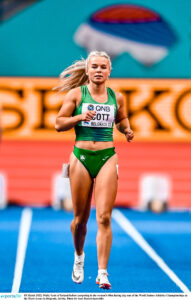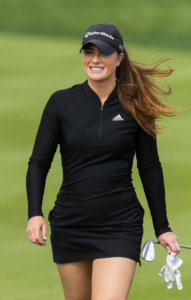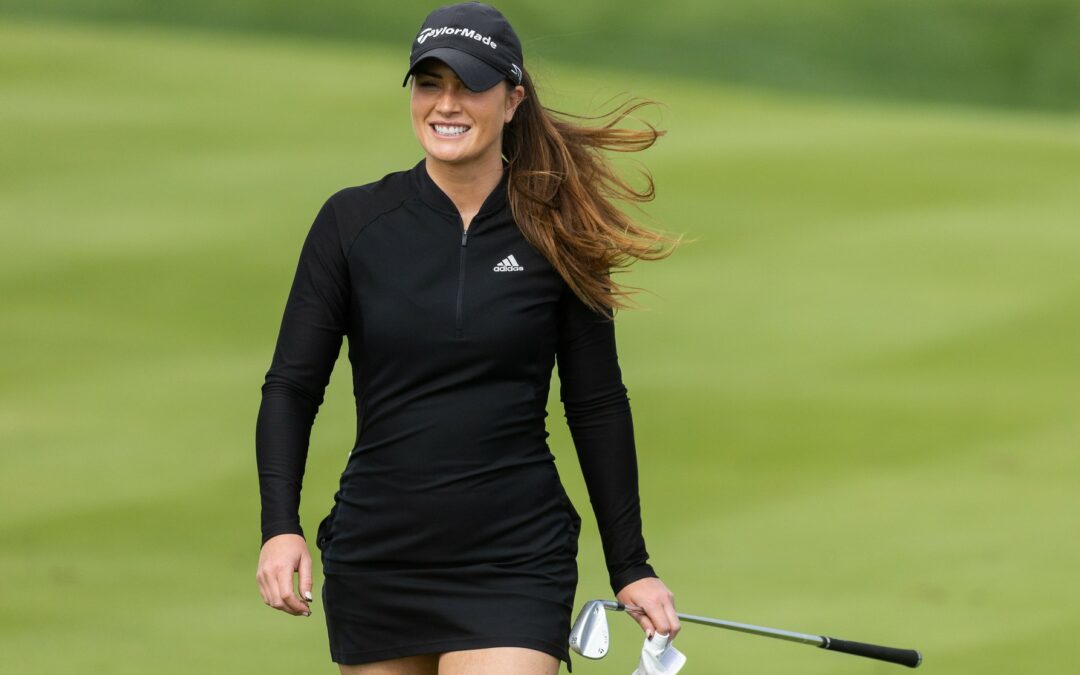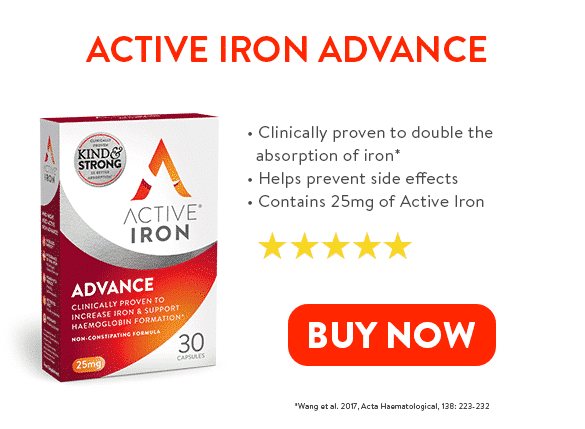Even as superhuman as they may seem, global female sports stars like Annabel Dimmock and Molly Scott face the same monthly challenges as many women. Here, they share ways to navigate your period while excelling in sport.
Managing your period is challenging enough but imagine doing it under the relentless spotlight of the national championships or the global professional golf circuit, with the weight of a nation’s expectations on your shoulders.
Irish track and field athlete Molly Scott, and professional English golfer Annabel Dimmock may compete in different sports and for different nations, but it’s a collective hurdle they must both overcome.
As part of Active Iron’s ‘Summer of Sport’ campaign, we spoke with the leading female athletes to find out how menstruation impacts their performance and the clever strategies they use to stay on top of their game.
How does your period affect your performance?
For Irish 60m national champion and record holder Molly Scott, her period brings a blend of physical and physiological symptoms that affect her performance. She explains: “I experience a variety of symptoms that often affect my performances. There have been times when I have had my period and experienced extreme back pain, which would often stop me from even completing my training sessions.
“Mentally, I feel more agitated and emotional than usual, making competing difficult. During my period, I also feel my coordination skills aren’t as sharp as normal.”
Annabel Dimmock, who competes on the Ladies European Tour, says her period mainly affects her mood and confidence, which can be really challenging when out on the golf course for hours at a time.
“I often find myself getting down, but I’ve learned to recognise this pattern,” she says. “When I catch myself being overly critical, I remind myself that it’s my physical state affecting my mindset, not my performance or how I’m hitting the ball. This awareness helps a lot.”
How do you manage your symptoms?
So how do leading athletes and global sports stars manage their symptoms?
According to both Scott and Dimmock, when it comes to dealing with their menstrual cycle and the associated symptoms, there is one common theme – preparation.
Former Scottish Women’s Open Championship winning golfer Dimmock says that making sure she is “extra prepared” is key to managing her monthly menstrual cycle.
“If it’s going to be a long day, I make sure I’ve got enough food to keep me going and stave off fatigue,” she says. “I’m in touch with my physio a lot, planning out what I eat throughout the month and adjusting my food choices based on where I am in my cycle.”
“I also make sure that I’m not doing my heavy training sessions when I’m on my period or when I think I’m about to come on,” says Dimmock. “I won’t be lifting heavy weights in the gym or squats, and instead focus on mobilising exercises, and work on my flexibility that week. The focus is on quality over quantity when I know I have limited energy. I need my energy to be spent out on the course or hitting balls, not moving weights around in the gym so I know I won’t end the gym session feeling really drained and tired.”
How important is nutrition during the menstrual cycle?
As a three-time national champion, Scott, like many professional athletes, is constantly juggling an intense schedule of training, travel and competition.
She says that no ‘one thing’ can fix everything when it comes to juggling the demands of her lifestyle and competing for national titles, but has found a combination of ways to help her body and mind feel their best,
“Getting 8-10 hours of sleep a night helps with any period-related fatigue, while following an anti-inflammatory diet, especially around your period, also helps keep your body and mind feeling fresh and rejuvenated,” says Scott. “Maintaining my iron levels keeps my energy up and personally I’ve found that taking an iron supplement such as Active Iron and magnesium has helped a lot with my symptoms.”
Low iron levels are a common phenomenon in athletes, particularly those involved in endurance sports. It has been reported to impact 3-11% of male athletes and 15-35% of female athletes¹.
Maintaining good iron levels is crucial for athletes because iron plays a vital role in producing myoglobin, a protein that carries and stores oxygen in muscle tissue. Low levels or depletion of iron can significantly impair athletic performance.
Nutrition experts recommend eating iron-rich foods as they can help maintain blood levels during this time and positively benefit concentration and fatigue, especially during the earlier phase of the menstrual cycle.
Animal-based sources like pork, ground beef, eggs, and dark meat chicken are highly bioavailable, helping to maintain blood levels during this time and positively benefit concentration and fatigue, especially during the earlier phase of the menstrual cycle. Plant-based sources such as spinach, broccoli, nuts, seeds, beans, and whole grains are also beneficial.
Iron supplements can assist in addressing low iron levels, particularly benefiting female athletes who find it challenging to meet their iron needs solely through diet. This difficulty may stem from busy schedules, dietary trends, or restrictions related to health conditions or specific dietary requirements.
While Scott is always on top of her nutrition and hydration, she makes sure to take that 1% extra care during her period, ensuring that she takes extra care with what she is eating and drinking, particularly when managing a busy training schedule, and is at risk of fatigue.
“During my period I try to avoid processed food and stick to whole foods like sweet potato, vegetables, fish and meat. It’s usually a time where you experience the most cravings so it’s important during your period that you have a full fridge of whole and healthy foods,” she says. “In the past, even whilst training I have over-indulged and binged during this time due to my increased hunger levels caused by periods which I think is common.”
For more advice on managing menstruation and exercise, or matching your nutrition to your cycle, visit our athletes page.
¹Sims. S. et al; High Prevalence of Iron Deficiency Exhibited in Internationally Competitive, Non-Professional Female Endurance Athletes—A Case Study Int J Environ Res Public Health; 2022

Molly Scott
Irish Athlete
Molly Scott is a sprinter and hurdler from Carlow, Ireland. She has been involved in athletics since age 7 and has always loved to compete. Throughout her career, she was a bronze medallist at the European u18 championships in the 100m hurdles in 2016, in 2018 she was part of the 4x100m women’s team that got silver at the World u20 Championships. She is a 3x National champion in the 60 metre and broke the national record to become one of the fastest Irish women. In 2022, she suffered a very serious injury, that tested her in ways she could not have imagined, but she has now recovered and is on her way back to her best. While she was injured, she focused on her studies and became a Barrister at Kings Inns. Molly loves anything that challenges her and she loves to make content that helps and inspires others to get through life’s challenges.

Annabel Dimmock
English golfer
Annabel Dimmock is an English professional golfer and Ladies European Tour player. As an amateur golfer, Annabel won the Helen Holm Scottish Women’s Open Championship and the Sunningdale Foursomes in 2014. Annabel also finished runner-up at the Welsh Women’s Open Stroke Play Championships and the Spanish International Ladies Amateur Championship. Annabel represented Europe in the 2014 Junior Ryder Cup, Great Britain and Ireland in the 2014 Curtis Cup, and Great Britain at the 2014 Summer Youth Olympics. Professionally, Annabel finished 3rd at the 2017 Lalla Meryem Cup, placed 1st at the 2019 Jabra Ladies Open, 4th place at the 2022 KPMG Women’s Irish Open.


